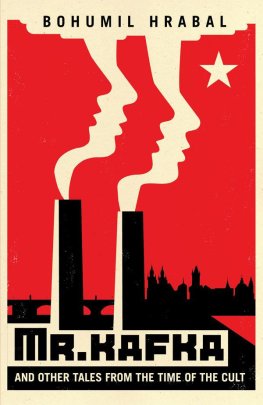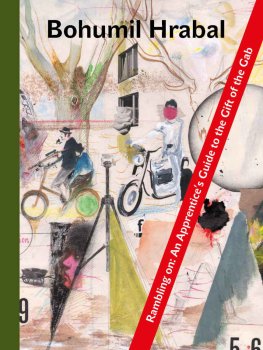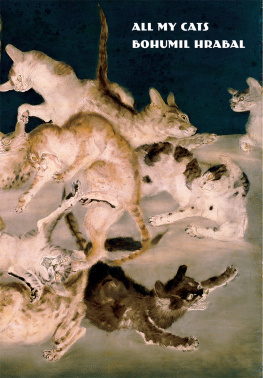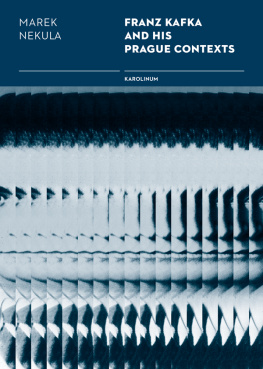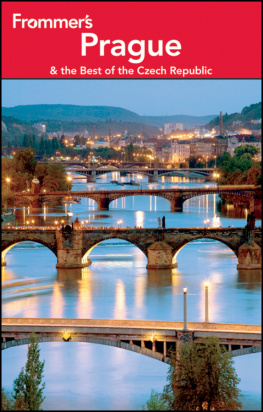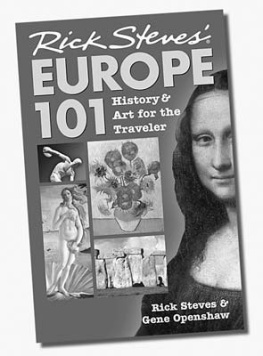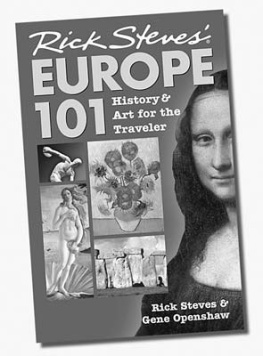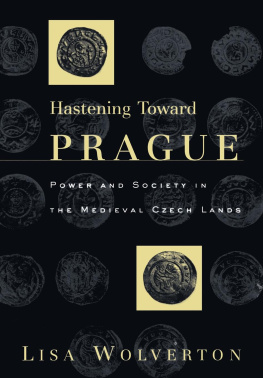Bohumil Hrabal
Mr. Kafka: And Other Tales From the Time of the Cult
A milk shop could sell its wares even in the dark
To begin living for oneself is greater than birth
Disbelief can be understood as indiscriminate attention
In any case, Im advertising a house I no longer wish to live in.
Viola Fierov
The stories in this book are an expression of a particular period referred to as the time of the cult of personality. Anyone seeking to find in this book mere condemnation, a thumbs-down, would be mistaken. During this period, I was living with people who felt, or knew, that every era carries in its womb a child in whom one may not only place ones hopes, but through whom and with whom it would be possible to go on living. They were people who had not forgotten the fundamental house rules of human coexistence and who were heroes if only because they had not succumbed to semantic confusion, but were able to call things and events by their real names and recognize them for what they were.
Thus this book is an expression not only of my own evolution, but of a part of societys evolution as well, a society I live in and that, like me, wishes to live in habitations where humor and the possibility of metaphysical escape reign supreme.
BOHUMIL HRABAL, 1965
Every morning my landlord enters my room on tiptoe. I can hear his footsteps. The room is so long that you could ride a bicycle from the door to my bed. My landlord leans over me, turns, signals to someone in the doorway, and says:
Mr. Kafkas here.
He prods the air three times with his finger, then walks slowly back to the door, where my landlady hands him a tin tray with a breakfast roll and a small cup of coffee on it. He carries it back to me and because his hands shake, the cup rattles on the tray. Sometimes, after such an awakening, I get to thinking: supposing my landlord came to wake me and announce my presence and I werent there? Hed be terribly startled, because hes been declaring my presence for several years now, just to remind me of that first week, when theyd bring me breakfast in bed each day and I would be absent.
Back then, the rain was falling as hard as it had in the time of the Flood, the river carried the water along in the same measured tempo as it always had, and I stood in the downpour not knowing if I should tap on the door with my finger or simply walk away. The linden leaves chattered like sparrows in the treetops, the light from the streetlamps oozed through the branches, and in the room beyond the half-open door a body was undressing, for sleep or for love. The light inside the room cast a broken shadow on the white enamel of the door and I wondered if the origin of the shadow was alone or with someone else. I shivered. The night rain was cold and my footprints vanished in the muddy downpour. And yet, I thought, its good to live in anxiety, good to hear ones teeth chatter in fear, good to push life to the brink of ruin and start afresh next morning. Its also good to part forever and to praise misfortune, like wily old Job. At the time, though, I stood there in the incessant rain not knowing whether to knock on the door or walk away, because I lacked the courage to pluck the eye of jealousy from my mind. I prayed: O Rainy Night, do not leave me standing here, do not abandon me to the mercy of banal beauties; let me at least kneel in the mud and stare at the locked house.
One morning, I asked: Poldinka, do you still love me?
Do you still love me? was her reply.
When next I awake, Ill ask her, Are you still asleep, Your Holiness? One day, perhaps, the mirror I hold to her mouth will fail to fog up.
I enter the building where I live. In the old days, a bell in the Tyn Churchs spire broke loose mid-peal, plummeted through the air, through the tiled roof, through the ceiling, and into the room I now occupy. Now, the landlady is leaning against the window frame lost in thought; the curtains billow and the invisible world is refreshed. Leaning out of my third-floor window I can almost touch the churchs stone wall. My landlady lets her russet hair tumble over me like asparagus fronds. Her breath smells of blueberry wine. I gaze at the Mother of God affixed to the church wall, looking as grave as the Margrave Gero. Pedestrians stroll past the bomb-damaged town hall and greet the unknown soldier.
You know what? my landlady whispers at my back. How would it be if we just gave each other a friendly little kiss. How about it, Mr. Kafka?
Im sorry, maam, I say, but Im true to my girl.
Look at you! she hisses. But youre hot stuff when it comes to boozing and lollygagging around. And she sweeps out of the room, leaving behind the lingering aroma of blueberry wine. The curtains billow, subside, then a thousand hummingbirds lift the organdy fabric in their tiny beaks like the train of a royal wedding gown, and the curtains billow again in the breeze. Somewhere in the building, someone is playing piano exercises from Czernys School of Velocity; a shabbily dressed man stands below the window, his face as pockmarked as his vulcanite suitcase. Mercury runs down the church wall. Bloated owls and baboons have fallen asleep on the cornices.
May I interest you in these toothbrushes?
No, thats impossible.
All the way from France, and of course, yes, theyre nylon two hundred and sixty-eight crowns a dozen.
No, no, no thats impossible!
Too expensive? Maybe so, but imagine, sir, how elegantly your customers will swirl round the dance floor polished with our product.
So thats why she made such a fuss.
And for something new, I can tell you that we have childrens hairbrushes in stock. Can I put you down for some?
Yes, but I can never bring myself to leave her.
Indeed, and the raw material is a hard-currency item.
Ill drown your house in flowers and curses.
And Ill give you two percent off if you pay in cash.
I could send the goods franco bord and youd have them next week. Whats this? Its a concoction made by Hivn & Co. Yes, the one who hung himself. Why? I couldnt say. Youd have to tell me first why our district judge went mad and why the coroner laughed. Just tighten your tie a little and ask your shadow: brother, are you really living?
I leap out of bed, crane my neck out the window, and look into the street as if peering down a well. I see a blonde female head nestling up to a young man, hear the sound of kisses like the crack of a whip carried all the way to my bedside by the breeze.
Dont back away. You cant have gone off me completely, the blonde implores, and bubbles of silence rise to the moon chinning itself on the crossbar of the night. I can still hear the cook that used to live here snoring through three walls. He snored so loudly I had to buy a fresh loaf of bread every day and plug my ears with soft tampons of bread, walling myself in each night, just so I could get to sleep. Now the blonde lies back tenderly on a pile of sand beside the church and pulls the young man down on top of her, setting loose several plaster-covered metal hoops that clatter over the lovers, but theyre oblivious. A white hoop rolls down the narrow alley like a full moon. The Mother of Gods hands are locked in cement and she cant even shield her sons eyes.
The Figaro Bar, the Spider, the Chapeau Rouge, the Romania, and the Magnet are all closing for the night. Someone around the corner vomits, and near the Old Town Square a citizen yells: I, sir, am a proud Czechoslovak!
Someone else slaps his face and says, So what?
A woman with blood streaming from her nose looks out from under a colonnade as though she, too, had just told the same mean-spirited citizen that she was a proud Czechoslovak. And in the middle of the square, a man in black drags a woman wearing a floral dress through a puddle, cursing the heavens. A right slut I married!

